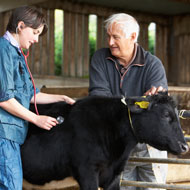
Cattle vets urged to learn about animal psychology
Farm vets should not be complacent about injuries sustained in the course of their work, says Lysan Eppink, honorary secretary for the British Cattle Veterinary Association (BCVA).
Speaking at an event hosted by the Institution of Occupational Safety and Health (IOSH), she said: "Us vets have got to change our attitude that it’s ok to be a little bit damaged – it’s not ok, and we need to make sure animals are handled safely to avoid injury."
Experts attending the event in York urged vets and farmers to learn about animal psychology to help ensure safety while treating or handling cattle.
The agriculture industry has one of the highest fatality rates in the UK. Of the 133 workers killed in the UK between 2013 and 2014, 27 were employed in the agriculture industry. Seven workers were killed after coming into contact with cattle. Many other people suffered injuries.
Lysan said: "We tend to be the nasty people that stick needles in or do things which are an unfamiliar management or handling situation for the animals, so we do get accidents.
"We are putting ourselves daily at risk and we have to manage it instead of going in gung-ho."
IOSH believes more should be done to improve safety in the agriculture industry. Key to this is educating vets and farmers about safe ways to work. Improving understanding of animal behaviour among handlers, farm advisors and equipment manufacturers may also result in the design of safer facilities.
Gwyn Barlow, member of IOSH's Rural Industries Group and chair of the event, said: "How we interact with the animals has changed over the years and by implication the way the animals behave and react, whether that’s with staff on the farm, a vet or walkers on a footpath, has also changed.
"We hope this event has provided more of an understanding of animal psychology and how to ensure they have good handling facilities in line with current guidance. Hopefully this promotion of best-practice will generate further good practice and improve safety within the industry."



 The Veterinary Medicines Directorate (VMD) is inviting applications from veterinary students to attend a one-week extramural studies (EMS) placement in July 2026.
The Veterinary Medicines Directorate (VMD) is inviting applications from veterinary students to attend a one-week extramural studies (EMS) placement in July 2026.